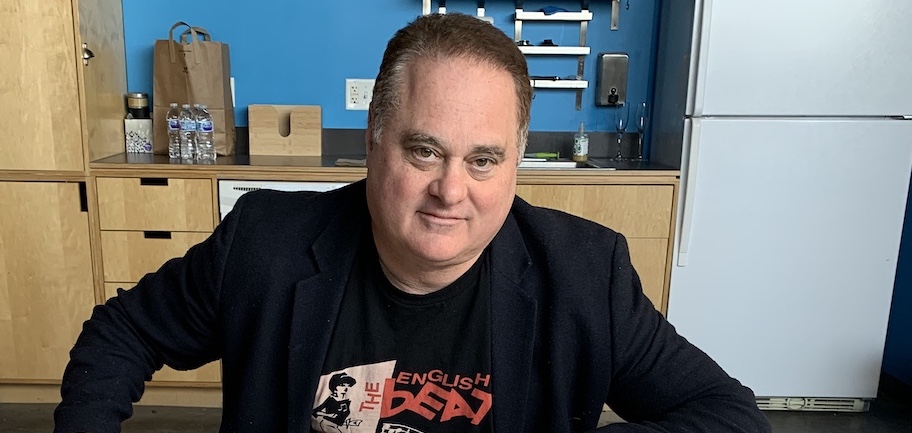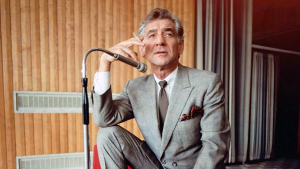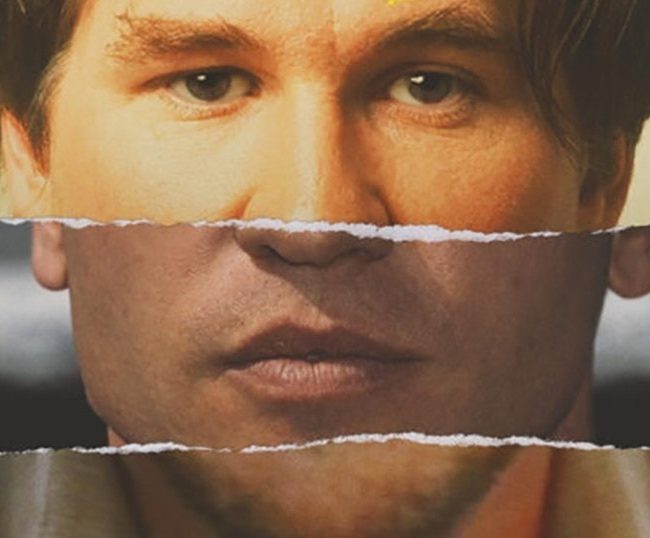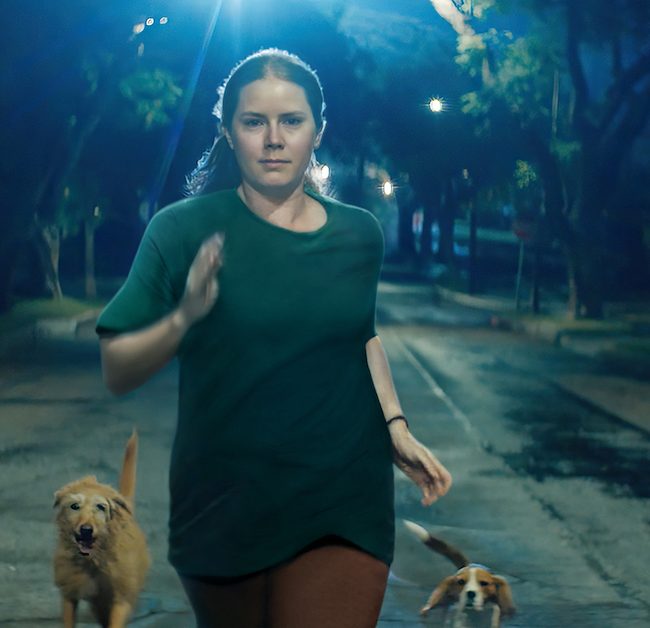A Conversation with Douglas Tirola (BERNSTEIN’S WALL)

I watched (and reviewed) Douglas Tirola’s documentary Bernstein’s Wall at the 2021 Tribeca Film Festival, where I very much enjoyed it. The film profiles the late, great conductor and composer Leonard Bernstein, bringing us from his early days all the way up to his final concerts, taking its title from his famous 1989 performance of Beethoven’s “Ode to Joy” (from the Ninth Symphony) in honor of the destruction of the Berlin Wall. Offering a rich treasure trove of details from both his personal and professional life, the movie is as comprehensive as it is thorough. I had a chance to chat with Tirola just after the Middleburg Film Festival, where Bernstein’s Wall also played. Here is a condensed digest of our conversation, edited for length and clarity.
Hammer to Nail: Your film is made up mostly of archival footage. You obviously have experience doing that, as I really loved your 2015 Drunk Stoned Brilliant Dead, which also features quite a lot of archival. For this film, what was the process of gathering that? What obstacles did you encounter?
Douglas Tirola: There are sort of two sides to it. The first side is what I would just refer to as the tag-sale side, meaning we scour the earth as one would go into tag sales in New England or the Midwest, just looking for anything we could find. And then obviously looking for specific things we needed. There were two big treasures. One was a 20-plus-hour interview conducted by John Gruen. John Gruen was Leonard Bernstein’s friend. He was a journalist. I think he’s best remembered for work done for New York Magazine and The Village Voice in the ‘70s and ‘80s. And in the late ‘60s, Bernstein went to Italy with his family and he took John Gruen and his family because they were also friends and Gruen did an interview with him over many days and hours. It wasn’t for a specific piece. Eventually, parts of it became part of a book, which also has a lot of photos in it from a different photographer.
So, we were able to get in touch with John Gruen’s daughter, Julia Gruen, who was transitioning out of many years as the head of the Keith Haring foundation. She therefore had this sort of artist’s perspective, just sympathetic to people who create things for a living. And she said, “If you can meet me tomorrow at 10 o’clock at this diner on Lexington Avenue, I’ll listen to what you have to say.” And we went from what was going to be a 15-minute coffee to an hour conversation. I explained my vision for this and that it wasn’t a straightforward biopic. And she agreed to help. And when you make these kinds of documentaries, or any movie, you need people to help you. And so she gave us access to these tapes. She also ended up giving us access to some photos, from other parts of Bernstein’s life, because her dad was a photographer, too. And that became a big part of the film because there is no Bernstein autobiography. There is no audio book. There is no definitive David Frost-style interview.
And then the other interview was from a documentary filmmaker named Peter Rosen. I think he was hired by the State Department to make a film about Bernstein. This was in the ‘70s. So he had made this documentary as part of a sort of state-sponsored cultural outreach, and it was only released in Europe, and I met with him and he agreed to let us use this. And he said, “I gave all the raw tapes to the Bernstein family.” So I spoke to the Leonard Bernstein Office, which is this great organization that keeps Lenny’s work out there and his ideas out there. And so between the Leonard Bernstein Office and this filmmaker, they gave us access to these big beta tapes. And that’s where you get a lot of the sort of off moments. These are those moments when a director yells “cut” and the film’s still rolling for a little bit and then later, in editing, the director will be like, “Find that look!” And so that’s where you get a lot of those bits where he’s lying on the couch or things that never made it into Rosen’s documentary but give you this essence of who Bernstein is.
HtN: Are you a lifelong Bernstein fan? What was your motivating factor in making this film, and making it now?
DT: What happened is I was researching a film, that I’d still like to make someday, about New York in the ‘80s. It was going to be told through E.B. White’s essay for a travel magazine in the late 1940s called “Here Is New York.” And in doing that research, I think I must have seen something about big moments of the ‘80s. And I came across Bernstein’s Christmas-morning concert in east Berlin, right after the Berlin Wall fell. I remember the concert, it was televised around the world, and I just started watching it, probably just like a nostalgia thing for myself. And there’s a little piece of him walking around Berlin, in the days before the concert, and being at the wall. And then that led me to look on YouTube for clips of stuff, just the way people do.
And there are two minutes where he’s talking about these other things that Beethoven means to him, inspired by the music, but not about the music. And I have years of these notebooks and I’m just always writing stuff down. I have terrible handwriting and I can’t read most of it afterwards, but it helps me remember. And I just started writing down these quotes of his. I found something where he talked about conducting, which to me was a complete metaphor for how I feel about directing. He talks about how people say that he must love to point his baton and everyone does what he wants. I’ve worked on a lot of movies and I’ve experienced those directors and some of their movies are great. And some of the experiences of them were great and some are less than great. I am not that kind of director. What I felt Bernstein was saying, was more: “I want everybody in the orchestra to understand why we’re doing this. I want us to breathe together. I want to bring the best out of them.”
That is how I approach directing. Which at 1AM can be frustrating for a crew because they don’t want to have a philosophical discussion for hours, they just want someone to tell them what to do. But that idea of bringing down walls, this conflict between his personal and family life and his career, which is obviously something that anyone in the creative arts struggles with … I’ve come to believe through this movie that actually anybody who does anything at a high level is doing that. Whether they’re just a cook, a teacher, a banker, anybody trying to achieve that level of art through their work, the highest level, not necessarily the highest exposure, just the highest level, I think has that.

Leonard Bernstein in BERNSTEIN’S WALL
I’ve been very lucky to have different aspects to my career. There’s the physical production part, which I worked in for many years on the bigger studio films, being a writer in a studio system, if that’s what they still call it. And then there is this incredible chapter, I don’t know how many years it is now, where I know we’ve produced 15 films and I’ve directed 6 or 7 of them, in the documentary world. And there were just things that I wanted to say. That’s why the film, I think, is very personal to me. I hope it’s personal to everybody. I think at the end of the movie, another thing I had found early on was when Bernstein talks about Beethoven and says, “Beethoven is about struggle, struggle for peace, struggle for love.” And he says it’s in his symphonies, his concertos, his quartets, his trios, which to me means, at least the way we’re trying to use it is to say to the audience, that you don’t have to be on the biggest stage. You don’t have to be in Lincoln Center or the Kennedy Center to make a difference. You make a difference in your community, whether that’s a big one or a small one, whether it’s the most important moment or a little moment. And his story became the way to say that.
I do absolutely believe that the things he’s talking about are things that we’re struggling with, for better or worse. It was a way to talk about social issues and politics without making a movie that was overtly preachy about those things. It was more like the scripted movies of the ‘40s and ‘50s, where it was sort of baked in there for those that were paying attention. And I love films like that. I’ve probably made films like that, but to have him say these things, in the beginning of the movie, such as “What’s the role of art and the artist to create social change? And do we do that through our creations?” I hope we capture the essence of him and satisfied people that want to see a movie about Leonard Bernstein.
HtN: Speaking of getting everything right, how did you approach talking about Bernstein’s sexuality? You have those letters from his wife on the screen, as well as their dialogue. And let me just say that I liked the way you handled the letters, just in terms of the visual presentation.
DT: I appreciate you mentioning that. You try to get some things that the audience didn’t know or they forgot about. So with his relationships with men, it’s a part of who he was, but I wanted to keep the discussion of his sexuality and his marriage to just that one visual device, bringing in new information from his and his wife Felicia’s perspectives.
HtN: Thanks for making the time to chat!
DT: Thank you so much.
– Christopher Llewellyn Reed (@ChrisReedFilm)
Doug Tirola; Bernstein’s Wall documentary film interview











